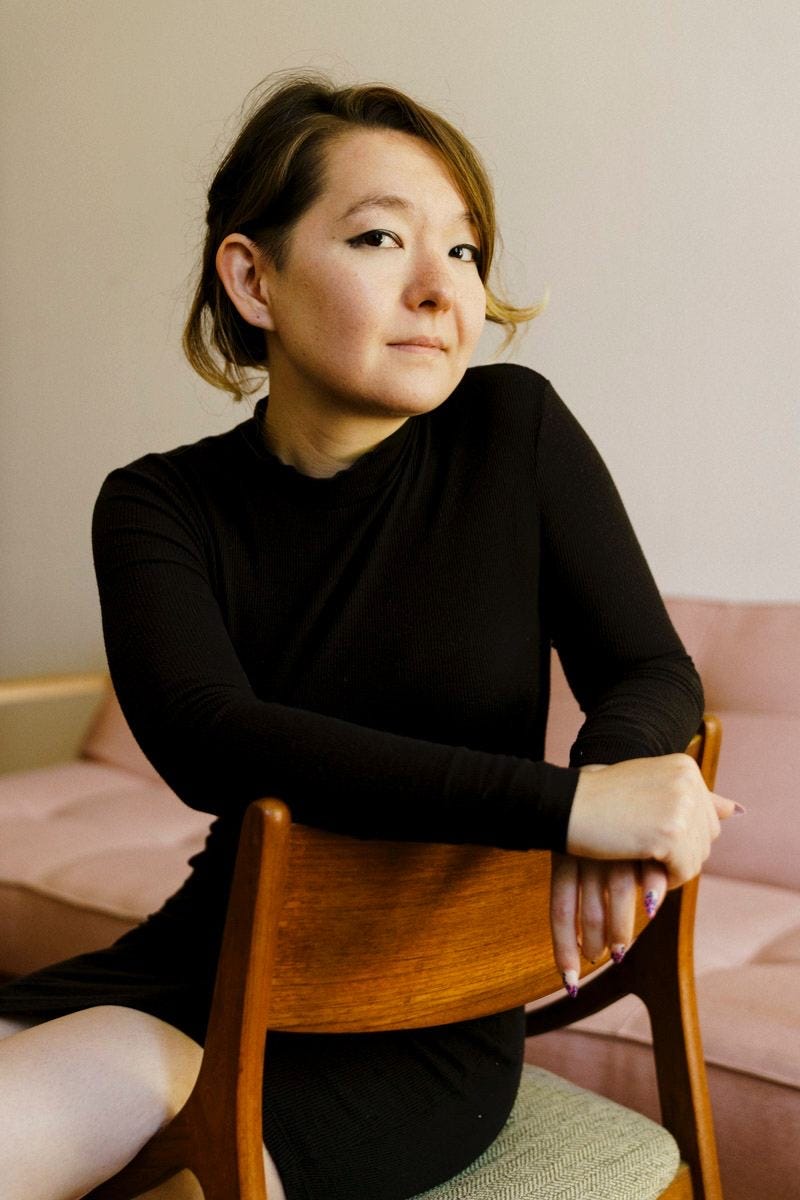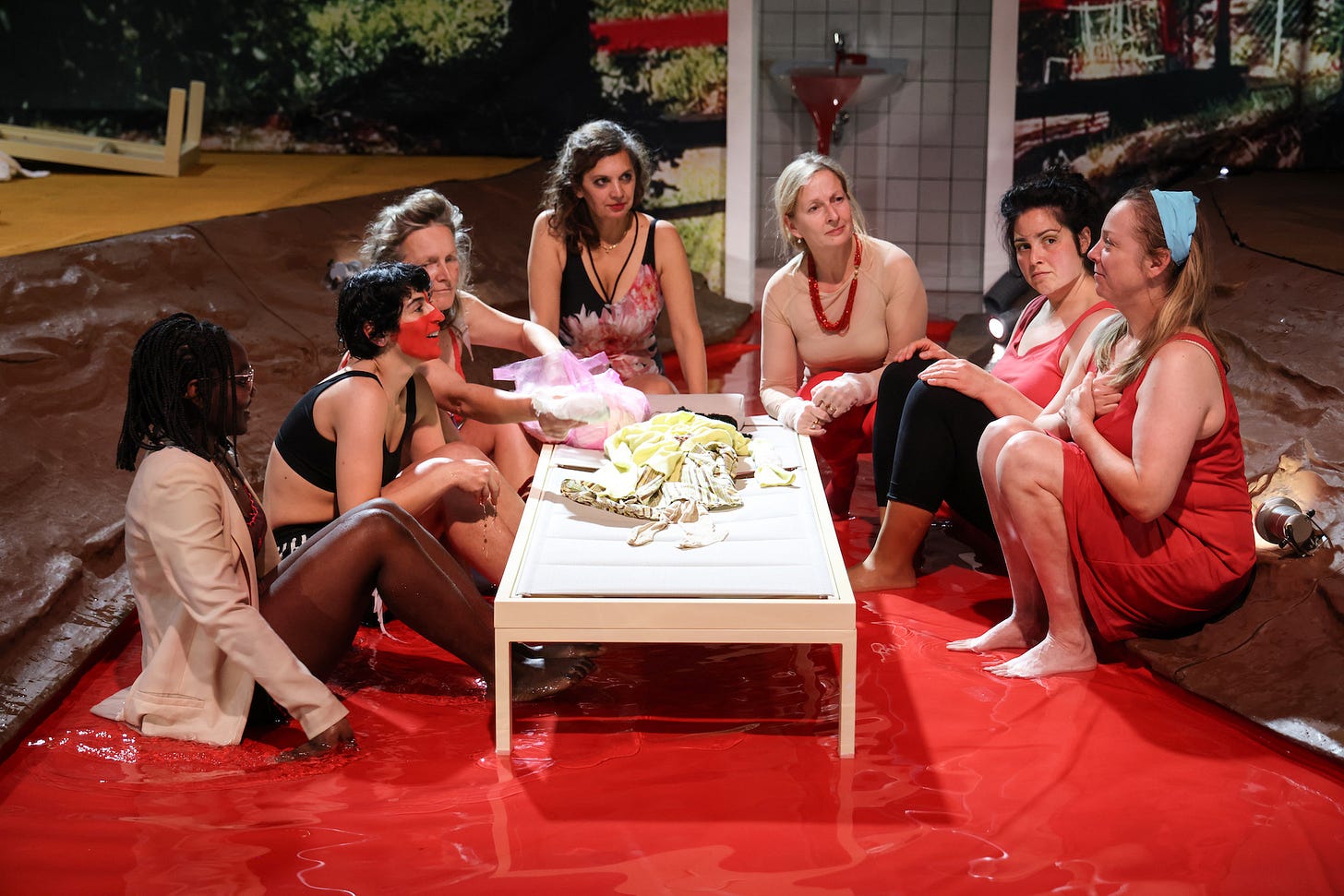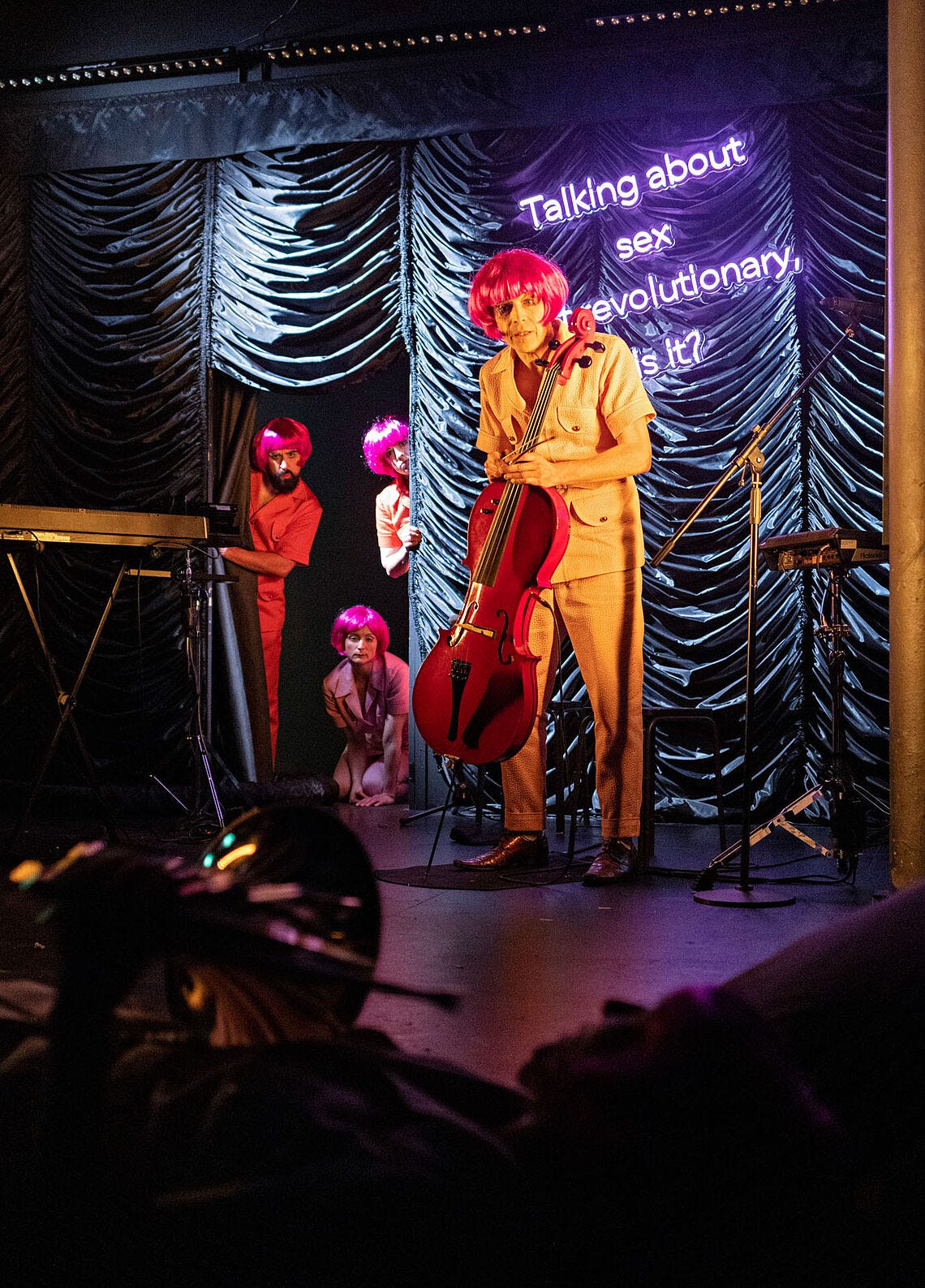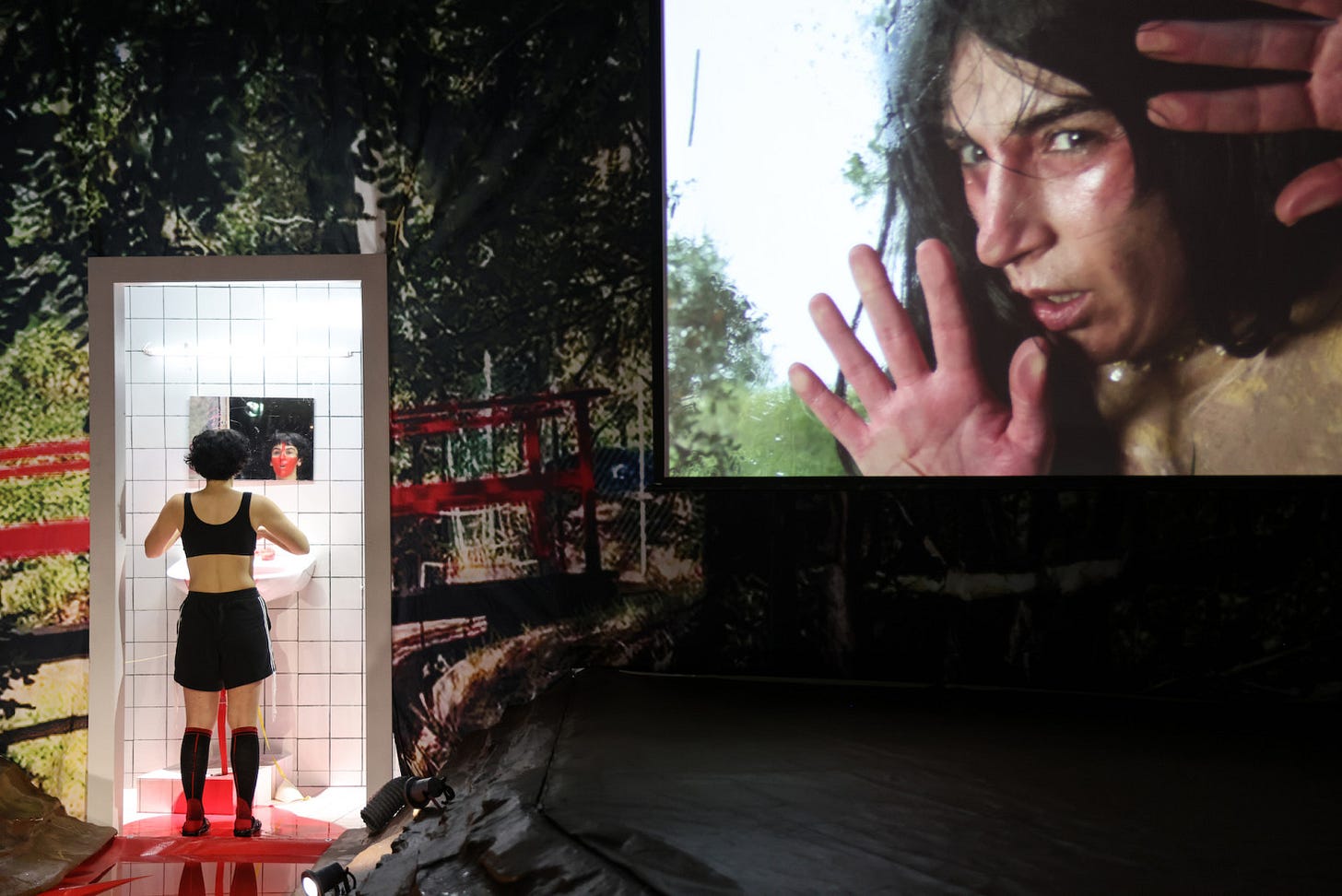Dear friends,
This April edition of my newsletter is a conversation between myself and Patty Kim Hamilton. Patty is a poet-playwright, writer, dramaturg, director and performance artist.
She is also kind of my twin, in a through-the-looking glass, road-not-traveled kind of way. We each grew up as American outsiders in small towns in Germany. Our paths first crossed directly at Ars Nova, when I was a member of their Playgroup and Patty was interning (though we didn’t yet know our shared background!). After that, I continued on being a playwright in NYC, while Patty moved back to Germany and made serious inroads into the theatre scene of the German-speaking world. Patty is currently a playwright-in-residence at the Deutsches Theater Berlin and had a world premiere of her play SCHMERZ CAMP at Theater Bremen.
I thought this would be a good and fun time to compare some notes on trying to make a creative life work in these different universes.
KT: Hi Patty. First things first. Tell me about your small German town.
PKH: Hello :) that’s a funny first question, because in the past few months I’ve learned it turns out people have a lot of associations with this place I thought was mostly unknown. It’s basically a small village attached to the city of Bonn, or maybe even a suburb of this larger town that is structured like a village (town center, small castle, bakeries, etc etc Germany blabla). But Bonn was the capital of West Germany during the time of divided Germany, so a lot of embassies and large organizations and wealthy people moved there. While it’s now very diverse (both in terms of class and race), people have a very clear imagination of private schools and Chanel bags, with all those things I mentioned before, and the Rhine, and the cherry blossoms, and some historical landmarks with more of an evil history.
KT: Quite different from mine, then. No Chanel bags in Lemberg, but memorably a school bus driver who smoked cigars on the bus which made me pass out. The region I grew up in was struggling economically, though architecturally I’ll bet my village looked a lot like yours. The region had a thriving cobbling industry until shoe fabrication moved to Italy. There’s a fountain sculpture nearby in Pirmasens, in which an assortment of fancy shoes are somehow emerging from the metallic bodies of two giant swans. At the time I lived there, there were many more U.S. military bases in the area, which had both a helpful and vexing effect on the local economy, as it infused it with fresh spending but also created a dependence on an influx that could and would ultimately subside.
PKH: I’d be very curious how you feel about the German language, whether knowing some of it impacts your relationship to English?
KT: Knowing German has gifted me a more malleable, playful sense of language. This comes out in different ways in different plays. In THUNDERBODIES I was playing with hard consonants and the harsh “ch” sound. Consonants are great for comedy. I was also smooshing words together in a way that was influenced by the German language’s love of compound words. How about you, how has it impacted your writing?
PKH: It’s hard for me to parse through what parts of my thoughts are German, and which are English. For the last seven years I’ve been living fully bilingually, switching back and forth mid sentence. However, I do think that German theatre and German literature taught me more directness, naming things with clarity, coming to a text with more power and exactness. It taught me how to work with the CHORUS. German can be very tender, but for poetic language I often reserve English, which is the most intimate part of my mind.
KT: Having now had a first production in Germany, I’m fascinated by how visually rich and visceral German theater tends to be. Language and the script remain vibrant components of the work but in different ways. Do you have any crackpot (or legitimate) theories as to why there’s this fundamental difference in form and aesthetic?
PKH: I love this question. When I read it I laughed out loud. I have a lot of theories, how legitimate they are, others will have to evaluate. German theatre was and is hugely impacted by the work of Brecht, and the history of the 20th century Regie-Theater (Director’s theatre). Text wasn’t holy (and often still isn’t). It was more about images, the voice of the director (which is shown through the Inszenierung, or direction, the use of bodies). This being said, there are also highly regarded writers, but they are examined through the lens of literature. My feeling is that since your text can be completely cut up by a director, writers are forced to write in a way that can not be circumvented. It’s a specific kind of lingual athleticism that is required. And yet slowly, things are changing. More and more, theaters and directors have greater respect for the writing and the writers.
One could argue through a feminist lens, that this is because slowly there is an increase in female writers and directors (of whom there were very little for a long time). The ego of the director was at the center, and also in some ways required, in order for the director to be viewed as a genius. Many of those productions are fantastic - but at what cost? There’s been a big movement to reflect on abuse of power, and fewer and fewer directors are being pushed who behave this way. Said in a very flat/unnuanced way - the previous male dominated field included greater violence. (I think this would be need to be explored more to really get to the core, but it’s a first theory, the same gendered things could also be said about other countries and do not apply. But Germany never adopted Stanislavski or realism in the same way those other places did).
Additionally, in order to understand the difference between the US and Germany, we need to talk about funding. State funded theatres receive up to 80% of their funding from the government. It shows the belief and respect Germany has for culture and art (this comes from a long history of art practice and export). This means that the directors and makers in the German theatre scene are somewhat free of the need to ‘sell’. It doesn’t have to be entertainment, because it is intended to be art. Of course, the theatres track what sells tickets, and they care, but they aren’t at the mercy of the audience. It can (and in many ways needs to) be experimental and strange, and often it feels like a closed loop of theatre practitioners and critics in conversation with one another. I would say this is both a strength and a drawback. Often, I wish pieces were more accessible to everyday audiences. At the same time, the sort of formally experimental work which is powerful, meaningful and expands our understanding of theatre most likely wouldn’t be able to be made in other countries.
KT: I had my own crackpot theory that the work is more visual and visceral because German culture and language is more direct, so there’s more of a need to create subtext through images and body language. But then I told someone this (an American director who often works in Europe) and he replied, in total disagreement, “But then how can you explain Hungarian theatre?” I realized my theory was incomplete, but probably we do need many partial explanations to account for how many cultural and structural differences are in play here. Exeunt did a great three-part series on European theatre a few years ago that has a number of intriguing observations, including director Teunkie Van Der Sluijs proposing that Europe’s history of wars and unstable borders and language regions fundamentally led to viewing language as both less of a constant and less trustworthy on its own.
KT: But let’s get back to my true obsession, German towns. You currently live in Gräfenhainichen, another small town that is closer to Leipzig and Berlin. Tell me about the artist's residency that you run there.
PKH: Yes, I live in both Gräfenhainichen and Berlin at the moment. But the place in Gräfenhainichen is a big villa, where I live with a community of loved ones. Our house is centered on community living, living alongside one another, building something beautiful and lasting together. Everyone is very creative, and we have a lot of extra space. Because of this, we are able to invite artists to come and stay with us for a month or more, and to work on a project and be part of our community for a bit. We don’t place any expectations on the residents in terms of artistic production - the impulse is for artists to come and be as they are. If they want to develop a project, I or one of the other’s works with them to develop a plan for the weeks they are there. But it’s highly individual - some people just need to sit in the hammock and stare at the trees for a bit.
Unfortunately, we’re not funded yet. But the cost of living is so low that most people who come to stay with us save significant amounts of money. And we’re working on applying for funding so that hopefully someday all the costs of stay can be covered and a stipend can be paid for the time the residents spend with us. We’ve had several U.S. playwrights, writers, directors and sculptures with us, and it’s been very meaningful for me to able to share space and processes together.
KT: In what ways do you feel more vs. less empowered as a playwright working in Germany?
PKH: This is a pandora’s box question. It won’t be possible to fully put it into words. But to quote a famous German playwright who taught a seminar I attended in grad school, ‘In Germany, you will not be respected but you will be paid. In the U.S. and England you will be respected, but you will not be paid.’ Now again, this is not wholly true, but as an overall take, it’s pretty hot. I’ve had my work taken apart, interpreted in ways I never would have thought of, set in the strangest situations, here in Germany.
I’ve also had really delightful collaborations, and the further I get into my work, the more positive my experiences become. As you get to know who your people are, who the collaborators are with whom you want to work, the work does get better. But you are dependent on the director, which is why I recommend other writers to connect with directors and build real and meaningful relationships with them. You have to practice a serious degree of non attachment to your productions, and take each opportunity to be on stage as a good thing for your work (and for your ability to sustain yourself wholly from your writing).
Because there is also less scarcity over here, each individual production doesn’t hold the same weight. This year I only had one production, but next year I’ll have between two and four. Not all of them are heart pieces, but I don’t know many U.S. playwrights who have several productions per year. And I do feel empowered to write - to try things out, to fail. There isn’t the same pressure that each piece needs to reinvent the wheel or be the greatest piece of literature. I’m able to determine for each piece what the depth of research and meaning is.
At the same time, I miss my plays being directed exactly as I wrote them. I do miss classical stagings, set in the setting I wrote them to be in. I also miss working with artists of color - I have my people here, but it’s a significantly less diverse country and theatrical landscape. I miss being politically aligned. Germany is in many ways still figuring out certain things that are already set in the U.S. The other way would be also true if I moved all my work back ‘home.’
PKH: What do you think it takes to create a sustainable, long term theatrical playwriting practice in the U.S.?
KT: One striking experience I had while in Germany for my premiere was how many theater people asked me, with earnest concern, how playwrights make money in the U.S. And my short answer is: We don’t. You can’t. You have to work a lot of other jobs, do a lot of other things, to fund writing time. Then they’d say, “but how can you find writing time if you are always working?” The most successful people I know in the field truly work so hard, all the time. For a few years, pre-pandemic, there was a prevailing wisdom that you would either support your writing through teaching in academia or with writing in TV. From what I see now, that’s morphed into many of us supporting our writing through both teaching academia and work in TV/film, at the same time, and these neighboring fields are going through struggles of their own.
Both teaching and TV/film have, simultaneously, become less lucrative… It's not a rosy picture. We’re going through a time of seemingly limitless executive compensation and struggles for fair pay for most everyone else. So if you want to do this, come do it but also join the fight for better labor conditions and think outside of the box. Fundamentally, if a system isn’t working, work outside of it, challenge it, seek alternatives that support your values and your voice. It’s important to remember you do have agency, and that you don’t have to go about things the way everyone else does, that careers are long and winding, and that the only constant really is change.
To go just a little deeper, a longer answer from me includes observing that writers working exclusively here have to calibrate mindset and expectations carefully. This includes accepting that writing is only one part of what you do, and only one aspect of a rich and full life. I don’t recommend dutifully going through the U.S. playwriting system to get your MFA and then expecting a comfy, middle-class existence primarily through writing. We have these harmful tropes about what it means to be a “real artist” now, but even Shakespeare was also a real estate investor and developer! I also think it is very, very smart to learn how to write across many media, and to consider doing more than one thing in the theatre, too.
Some individuals do figure out financial sustainability through a mix of being creative about their life choices, being driven, being strategic, and getting lucky. I’ll write more about that in future newsletters. I think sometimes about how the pursuit of happiness is written into our Constitution, and about how the root word “hap” means chance, fortune, luck. We have the right to pursue getting lucky.
PKH: I know a lot of people are probably asking this question, but what is your prognosis for the ‘American’ theatre? What are your hopes for the future?
KT: I take great comfort in the fact that I don’t know the future and that none of us do. That expands my sense of possibility. The future is something we make. I believe gathering live in rooms together for complex shared experiences is an essential human practice that has only become more important in the age of screens. So I am trying to do my small part in the present by advocating for our theater to continue to exist and evolve, and for it to keep becoming more diverse in form, content, audiences, and criticism.
In part because so much U.S. arts education has been defunded, it seems to me there’s a need to keep experimenting with museum-like levels of context for what theater even is, not to mention the many dramaturgies and lineages it can hold. For example, I’m a big fan of all the context and conversation Playwrights Horizons has been cultivating around their recent productions. And I believe we have to keep exploring ways to co-exist with technology, to film more live productions and to do that well.
I am glad there is currently a bill being put forward in Congress to help struggling non-profit theaters over the next five years. I think we’re cutting ourselves off at the knees if we don’t even advocate for more state and government support for the arts, no matter how far we’ve currently landed from that reality.
Finally (for now), part of why I wanted us to chat is that I’m particularly interested in greater international collaboration and communication as part of the way forward. This is my post-pandemic note #2. I hope for more co-productions and touring productions, as well as more simple conversations between practitioners from different countries who know the ins and outs of different working models. I can say it was tremendously helpful for me, through even briefly working in Germany, to realize I’d been telling myself an unhelpful lie about the inevitability of theatre being replaced by newer media.
The need to exchange ideas is a two-way street, since no system, city, or country is a flawless paradise. The more you zoom in the more you can see where things are currently under strain. As just one example, living in Berlin has gotten dramatically more expensive, and that’s currently impacting who can afford to accept work at the city’s theaters.
LINKS IF YOU WANT TO DELVE DEEPER:
STAGE Act Legislation being proposed in U.S. Congress now
Exeunt Magazine’s A European Theatre Dialogue, Part One, Part Two, Part Three
Outrageous Fortune: The Life and Times of the New American Play
Patty Kim Hamilton’s website
LINKS IF YOU NEED A FINAL NUDGE FOR CLASSES:
Draft Zero and The Rewrite start next week. Get off that fence and come write! Your future self will thank you.









My background is in German theatre, so I found this conversation to be quite interesting!
Thank you!